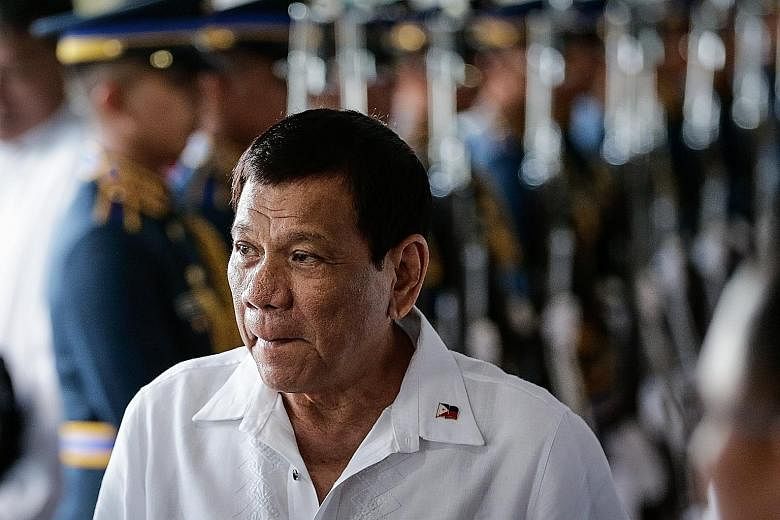President Rodrigo Duterte yesterday formally began the process to withdraw from a United Nations treaty that created the International Criminal Court (ICC), citing a concerted effort by UN rights probers to paint him as "a ruthless and heartless violator of human rights".
Chafing at the "baseless, unprecedented and outrageous attacks on my person", Mr Duterte said in a statement that he was serving notice that the Philippines was withdrawing its ratification of the Rome Statute.
Adopted and signed by 123 states in 1998 at a conference in Rome, the treaty created the ICC and gave it jurisdiction over genocide, crimes against humanity, and war crimes.
The Philippines signed the Rome Statute in 2000, and ratified and endorsed it in 2011.
Former solicitor-general Florin Hilbay said it would take a year from the day Mr Duterte notifies the ICC before the Philippines is considered withdrawn as a signatory.
He added that withdrawing from the ICC would not stop the case lodged in the court by a Philippine congressman and a lawyer who accuse Mr Duterte of "crimes against humanity" for extrajudicial killings.
The ICC last month began a preliminary investigation into the controversial crackdown on the narcotics trade which, according to police, has left nearly 5,000 suspects dead in shoot-outs during drug raids since Mr Duterte took office in mid-June 2016.
But human rights activists insist more than 20,000 have been killed in the brutal anti-drug war that has mostly targeted the country's poorest districts. Two-thirds are believed to have been killed by paid assassins backed by the police.
In the statement issued by his chief counsel yesterday, Mr Duterte said the drug killings did not constitute "crimes against humanity", or even genocide or war crimes.
"The deaths occurring in the process of legitimate police operation lacked the intent to kill," said Mr Duterte.
He said they resulted from police defending themselves, "a justifying circumstance under our criminal law".
Mr Duterte has in the past also insisted that the ICC lacked jurisdiction over him.
Yesterday he also blasted UN special rapporteur Agnes Callamard and UN rights chief Zeid Ra'ad al-Hussein for their bias.
Ms Callamard is leading a UN investigation into the extrajudicial killings in the Philippines and claims that Mr Duterte has tried to intimidate her and her fellow special rapporteurs.
Mr Zeid has also taken aim at Mr Duterte, saying that he "needs to submit himself to some sort of psychiatric evaluation" for describing Ms Callamard as malnourished and referring to ICC prosecutor Fatou Bensouda as "that black woman".
"It is apparent that the ICC is being utilised as a political tool against the Philippines," said Mr Duterte.
But rights groups slammed his decision on the UN treaty as "self-serving", saying it stemmed from "a rabid refusal" to be held accountable.

